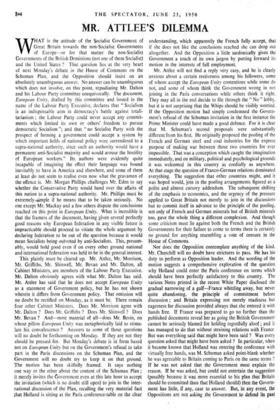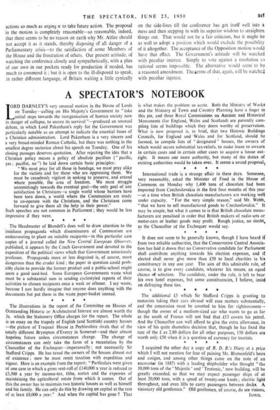MR. ATTLEE'S DILEMMA
HAT is the attitude of the Socialist Government of Great Britain towards the non-Socialist Governments of Europe—or for that matter the non-Socialist Governments of the British Dominions (not one of them Socialist) and the United States ? That question lies at the very heart of next Monday's debate in the House of Commons on the Schuman Plan, and the Opposition should insist on an absolutely unambiguous answer. No answer can be unambiguous which does not involve, on this point, repudiating Mr. Dalton and his Labour Party committee unequivocally. The document, European Unity, drafted by this committee and issued in the name of the Labour Party Executive, declares that " Socialism is an indispensable arm in democracy's battle against totali- tarianism ; the Labour Party could never accept any commit- ments which limited its own or others' freedom to pursue democratic Socialism "; and that " no Socialist Party with the prospect of forming a government could accept a system by which important fields of national policy were surrendered to a supra-national authority, since such an authority would have a permanent anti-Socialist majority and would arouse the hostility of European workers." Its authors were evidently quite incapable of imagining the effect their language was bound inevitably to have in America and elsewhere, and some of them at least do not seem to realise even now what the gravamen of the offence is. Mr. Morgan Phillips challenges Mr. Eden to say whether the Conservative Party would hand over the affairs of this nation to a supra-national authority. Mr. Phillips must be extremely.simple if he means that to be taken seriously. No one except Mr. Mackay and a few others dispute the conclusions reached on this point in European Unity. What is incredible is that the framers of the document, having given several perfectly good reasons why European federation in any visible future is impracticable should proceed to vitiate the whole argument by declaring federation to be out of the question because it would mean Socialists being outvoted by anti-Socialists. This, presum- ably, would hold good even if on every other ground national and international federation was held to be in the general interest.
This plainly must' be cleared up. Mr. Attlee, Mr. Morrison, Mr. Griffiths, Mr. Shinwell, Mr. Bevan and Mr. Dalton, all Cabinet Ministers, are members of the Labour Party Executive. Mr. Dalton obviously agrees with what Mr. Dalton has said. Mr. Attlee has said that he does not accept European Unity as a statement of Government policy, but he has not shown wherein it differs from Government policy. That omission will no doubt be rectified on Monday, as it must be. There remain four other Cabinet Ministers. Does Mr. Morrison agree with Mr. Dalton ? Does Mr. Griffiths ? Does Mr. Shinwell ? Does Mr. Bevan ? And—most material of all—does Mr. Bevin, on whose pillow European Unity was metaphorically laid to stimu- late his convalescence ? Answers to some of those questions will no doubt be forthcoming on Monday. If they are not they should be pressed for. But Monday's debate is in form based not on European Unity but on the Government's refusal to take part in the Paris discussions on the Schuman Plan, and the Government will no doubt try to keep it on that ground. The motion has been skilfully framed. It says nothing one way or the other about the content of the Schuman Plan ; it merely invites the Government even at this late hour to accept the invitation (which is no doubt still open) to join in the inter- national discussion of the Plan, recalling the very material fact Oat Holland is sitting at the Paris conference-table on the clear understanding, which apparently the French fully accept, that if she does not like the conclusions reached she can drop out altogether. And the Opposition a little sardonically gives the Government a touch of its own jargon by putting forward its motion in the interests of full employment.
Mr. Mike will not find a reply very easy, and he is clearly anxious about a certain restiveness among his followers, some of whom accept the. European Unity contentions while some do not, and some of whom think the Government wrong in not joining in the Paris conversations while others think it right. They may all in the end decide to file through the " No " lobby, but it is not surprising that the Whips should be visibly worried. If the Opposition motion had simply condemned the Govern- ment's refusal of the Schuman invitation in the first instance the Prime Minister could have made a good defence. For it is clear that M. Schuman's second proposals were substantially different from his first. He originally proposed the pooling of the French and German steel and coal industries for the express purpose of making war between those two countries for ever impossible. That was a conception which caught the imagination immediately, and on military, political and psychological grounds it was welcomed in this country as cordially as anywhere. At that stage the question of Franco-German relations dominated everything. The suggestion that other countries might, and it was hoped would, join in the pooling arrangements figured as a polite and almost cursory addendum. The subsequent shifting of the emphasis to economics, and the urgency of the pressure applied to Great Britain not merely to join in the discussions but to commit itself in advance to the principle of the pooling, not only of French and German minerals but of British minerals too, gave the whole thing a different complexion. And though some criticism must lie against both the French and the British Governments for their failure to come to terms there is certainly no ground for anything resembling a vote of censure in the House of commons. Nor does the Opposition contemplate anything of the kind. Mr. Churchill will no doubt have strictures to pass. He has his duty to perform as Opposition leader. And the wording of the motion suggests a comprehensive exploration of the question why Holland could enter the Paris conference on terms which should have been perfectly satisfactory to this country. The various Notes printed in the recent White Paper disclosed the gradual narrowing of a gulf—France whittling away, but never quite abandoning, the principle of commitment before discussion ; and Britain expressing not merely readiness but eagerness for discussion provided always that she entered it with hands free. If France was prepared to go no further than the published documents reveal her as going the British Government cannot be seriously blamed for holding regretfully aloof ; and has managed to do that without straining relations with France. But was everything said that might have been said ? Was every question asked that might have been asked ? In particular, when it became known that Holland was entering the conference with virtually free hands, was M. Schuman asked point-blank whether he was agreeable to Britain coming to Paris on the same terms ? If he was not asked that the Government must explain the reason. If he was asked, but could not entertain the suggestion (possibly because it was more essential to his plan that Britain should be committed than that Holland should) then the Govern- ment has little, if any, case to answer. But, in any event, the Oppositions are not asking the Government to defend its past actions so much as urging it to take future action. The proposal in the motion is completely reasonable—so reasonable, indeed, that there seems to be no reason on earth why Mr. Attlee should not accept it as it stands, thereby disposing of all danger of a Parliamentary crisis—to the satisfaction of some Members of the House and the frustration of others. Our present attitude, of watching the conference closely and sympathetically, with a plan of our own in our pockets ready for production if needed, has much to commend it ; but it is open to the ill-disposed to speak, in rather different language, of Britain waiting a little cynically on the side-lines till the conference has got itself well into a mess and then stepping in with its superior wisdom to straighten things out. That would not be a fair criticism, but it might be as well to adopt a. position which would exclude the possibility of it altogether. The acceptance of the Opposition motion would have that effect. The Government's attitude will be watched with peculiar interest. Simply to vote against a resolution so rational seems impossible. The alternative would seem' to be a reasoned amendment. Theierms of that, again, will be watched with peculiar interest.



































 Previous page
Previous page